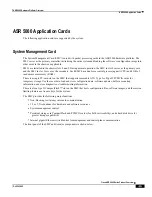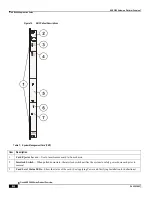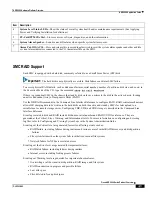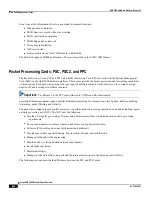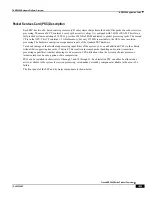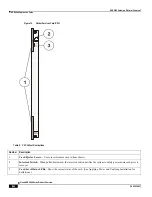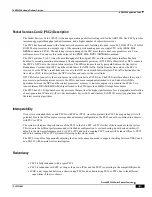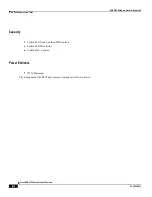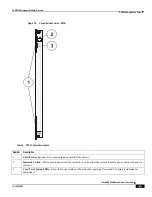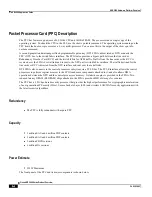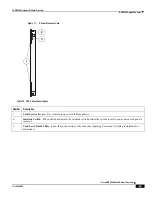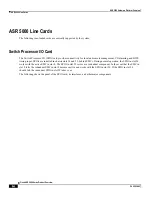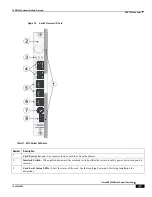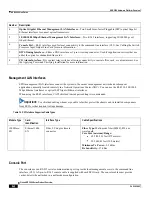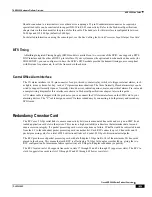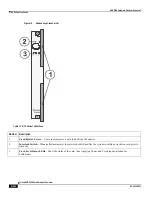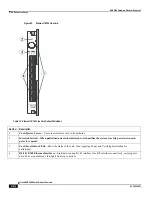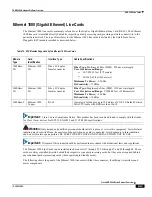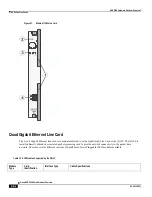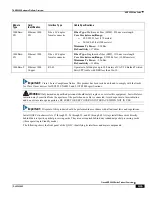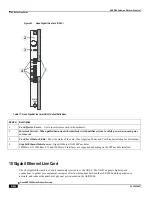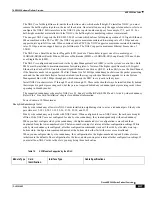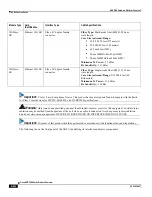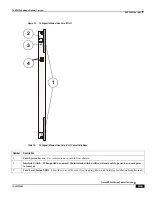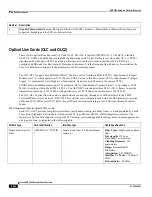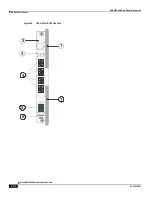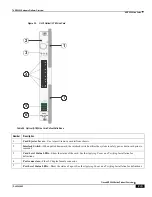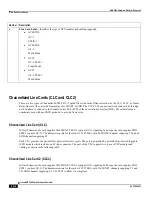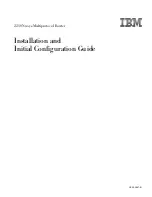
ASR 5000 Hardware Platform Overview
ASR 5000 Line Cards ▀
Cisco ASR 5000 Series Product Overview ▄
OL-22938-02
Should connection to a terminal server or other device requiring a 25-pin D-subminiature connector be required, a
specialized cable can be constructed to support DB-25 to RJ-45 connectivity. Refer to the Technical Specifications
chapter later in this document for the pin-outs for this cable. The baud rate for this interface is configurable between
9600 bps and 115,200 bps (default is 9600 bps).
For detailed information on using the console port, see the See
Cabling the Switch Processor Input/Output Line Card
.
BITS Timing
A Building Integrated Timing Supply (BITS) module is available on two versions of the SPIO: one supports a BITS
BNC interface and the other a BITS 3-pin interface. If your system uses the optical and/or channelized line cards (for
SDH/SONET), you can configure it to have the SPIO‘s BITS module provide the transmit timing source, compliant
with Stratum 3 requirements, for all the line cards in the chassis.
Central Office Alarm Interface
The CO alarm interface is a 10-pin connector for up to three dry-contact relay switches to trigger external alarms, such
as lights, sirens or horns, for bay, rack, or CO premise alarm situations. The three Normally Closed alarm relays can be
wired to support Normally Open or Normally Closed devices, indicating minor, major, and critical alarms. Pin-outs and
a sample wiring diagram for this interface are shown in Technical Specifications chapter, later in this guide.
A CO alarm cable is shipped with the product so you can connect the CO Alarm interfaces on the SPIO card to your
alarming devices. The ―Y‖ cable design ensures CO alarm redundancy by connecting to both primary and secondary
SPIO cards.
Redundancy Crossbar Card
The RCC uses 5 Gbps serial links to ensure connectivity between rear-mounted line cards and every non-SMC front-
loaded application card slot in the system. This creates a high availability architecture that minimizes data loss and
ensures session integrity. If a packet processing card were to experience a failure, IP traffic would be redirected to and
from the LC to the redundant packet processing card in another slot. Each RCC connects up to 14 line cards and 14
packet processing cards for a total of 28 bi-directional links or 56 serial 2.5 Gbps bi-directional serial paths.
The RCC provides each packet processing card with a full-duplex 5 Gbps link to 14 (of the maximum 28) line cards
placed in the chassis. This means that each RCC is effectively a 70 Gbps full-duplex crossbar fabric, giving the two
RCC configuration (for maximum failover protection) a 140 Gbps full-duplex redundancy capability.
The RCC located in slot 40 supports line cards in slots 17 through 23 and 26 through 32 (upper rear slots). The RCC in
slot 41 supports line cards in slots 33 through 39 and 42 through 48 (lower rear slots):
Summary of Contents for ASR 5000 Series
Page 1: ......
Page 26: ......
Page 48: ...New In Release 10 0 SCM Features Cisco ASR 5000 Series Product Overview OL 22938 02 ...
Page 50: ......
Page 58: ......
Page 68: ......
Page 126: ......
Page 138: ......
Page 146: ......
Page 218: ......
Page 236: ......
Page 356: ......
Page 374: ......
Page 422: ......
Page 496: ......
Page 572: ......
Page 654: ......
Page 700: ......
Page 726: ......
Page 784: ......
Page 816: ......
Page 844: ......
Page 906: ......
Page 926: ......
Page 942: ......
Page 943: ...Cisco ASR 5000 Series Product Overview OL 22938 02 Chapter 30 Technical Specifications ...
Page 966: ......
Page 972: ......

